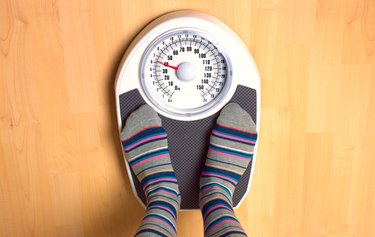
Scales measure much more than just your fat weight. They also measure water retention, muscle, bone, feces, urine, food and beverages, and swelling from inflammation or hormones. The number on the scale can fluctuate about three to five pounds day to day and even hour to hour -- even if you haven't consumed any food or drink. If you step on the scale twice in one day -- with only an hour between visits -- it's possible that the number on the scale might increase, but that doesn't mean you've put on fat during that time.
Scales Aren't Always Accurate
Video of the Day
If you weigh yourself on two different scales, an hour apart, you might think your weight has increased. Scales aren't calibrated in the same way and can report different weights. For example, if you weigh yourself at home and then go to a doctor's appointment an hour later and the office scale shows a heavier reading, you didn't actually gain weight between the time you weighed yourself at home and then again in the doctor's office. The difference lies in the varying methods scales use to measure weight.
Video of the Day
Scales can be finicky, depending on their quality. If you don't stand on the scale in exactly the same way every time, the scale can show different measurements, even if the measurements are taken minutes apart. Be sure your scale is zeroed out when you weigh yourself; if your scale is not at zero when you step on it, the scale may show a reading that's higher than your actual weight.
Weighing Circumstances
If you are wearing clothes or shoes -- or even a robe -- it's possible to gain weight on the scale almost instantly. For example, if you weighed yourself in the buff when you woke up, then hopped on the scale again just before you went to work, you might see a difference between the two readings. A 2014 study published in the International Journal of Obesity found that clothes adds 1.76 pounds to a woman's weight, for an average woman and 2.64 pounds for an average man. This difference also varies among seasons, since clothes for the cooler seasons generally weigh more than clothes for the warmer seasons.
Fluid Retention and Weight Gain
You can retain fluid after eating a salty meal or because of hormones, weight training or inflammation. While the effects of excess water retention is most obvious overnight or after several hours, it can show up within an hour. Weight training causes micro tears in your muscle fibers. Fluids concentrate around these micro tears to start the healing process, which often results in the "pump" bodybuilders seek to achieve. These fluids can also cause a slight increase in the number on the scale. Even if you didn't properly hydrate during your session, it can seem as if you gained weight.
Weigh Yourself Regularly, But Not Compulsively
It's impossible to gain a pound of fat in an hour. To gain a pound of fat, you must eat 3,500 calories over the number of calories your body burns, and then your body has to turn that energy into fat. Instead of weighing yourself several times a day, or even every day, try weighing yourself only once a week, simply to track trends. A study conducted by Cornell University in 2014 found that you usually weigh the least on Friday morning. If you're aiming to lose weight, weighing yourself at this time may boost your morale.
- International Journal of Obesity: Effect of Clothing Weight on Body Weight
- Shape: When Your Weight Fluctuates: What’s Normal and What’s Not
- CNN: How Is It Possible for My Weight to Fluctuate So Much?
- Psychology Today: Do You Suffer From Scale Addiction?
- Cornell University Food and Brand Lab: Whether You Lose or Gain Weight Depends on Weekdays